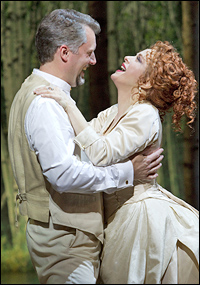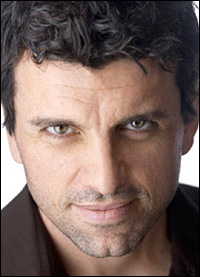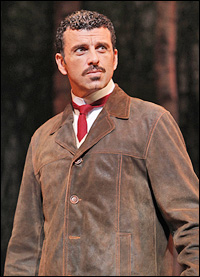
*
Stephen R. Buntrock and Bradley Dean move into the roles of lawyer Fredrik and saber-rattling soldier Carl-Magnus, respectively, vying for the attention of actress Desiree, played by Bernadette Peters. Both men have been with the company from opening night and both have spent time playing Madame Armfeldt's butler, Frid. Dean moved up from Frid to Carl-Magnus a couple weeks back and Buntrock (originally Mr. Lindquist, a liebeslieder) played Frid in the meantime, and begins as Fredrik Sept. 28, after the Sept. 26 departure of Alexander Hanson, a former Playbill.com Leading Men subject. For now, their wheelchair-pushing days are behind them.
THE ROCK
Stephen R. Buntrock has the task of replacing what one person called "the soul of the company" in Alexander Hanson, who played Fredrik in London and was the only cast member to move on to Broadway. The person who referred to Hanson as such was none other than Buntrock himself in a toast to the departing Hanson a few nights ago. Buntrock has been with the show himself since opening night as Mr. Lindquist, Frid and the understudy for Fredrik. The Naperville, IL, native made his Broadway debut on the 10th anniversary of Les Miz and has been in Phantom, Beauty and the Beast, Titanic, Jane Eyre, Oklahoma! and Grease as well as many tours. He is married to actress Erin Dilly (beloved for her turn and recording in the Encores! concert of Babes in Arms).
The new Fredrik in A Little Night Music. That's got to be a very exciting thing for you.
It is very exciting, and it seems to me that I just can't wrap my head around it as of yet. I'm sure by next Tuesday evening [Sept. 28], I'll have to do that. On an excitement level, does this rank right up there with some of the great shows you've done?
The excitement level is to be able to be on stage and share the stage with Bernadette Peters. She is, I have come to know, one of the most generous actresses that I have ever met. Then to actually have the chance to go through three hours and then end up in her arms… I got to tell you, nothing's better than that.
You get to share the stage with her during a lot of great moments. During the "Send in the Clowns" number, one of the most powerful in theatre, how do you approach that scene when you're just sort of standing there while she sings?
It's funny, when she came into the company, the cast had about two weeks off, kind of like a hiatus. The producers asked me to stick around and help out. Alex went back to London for a little bit to rejuvenate, and I was able to rehearse Fredrik with her. I was so excited, hearing her voice with this material. You just immediately think of her and Sondheim, as nothing is better than that pairing on stage. So when you actually get a chance to have her sing this music and these words, I literally was transported. I kept on looking at Seth [Sklar-Heyn], the associate director, during the rehearsals and going, "I cannot believe I get to do this!"
But going back to your actual question, the scene going into the song is so incredibly small and intimate and powerful and weighted, and really there's not much that I have to do. I just have to look into those eyes, and I am carried along by her performance in that scene. And I look forward to being carried along in the other parts of the show too. She's that good. You really do not have to try very hard. Everything is out on the table with her; everything is on the arm sleeve for you to grab a hold of and take part, and also I have to give a shout out to Alex. He has created such an incredible Fredrik that I have watched and admired, and, I am not shy to say, copied.
 |
||
| Stephen R. Buntrock and Bernadette Peters in A Little Night Music |
||
| photo by Joan Marcus |
During rehearsals of the original company with Catherine Zeta-Jones and Angela Lansbury, there was a sense from the cast of looking toward him because he had gone through the process in London... Everybody kind of looked to him for the jumping off point for what everybody else should do. To kind of expand on my answer here, when I was understudying him and I knew I had to go on with Catherine — Catherine was absolutely a lovely actress to be on stage with also — but I just wanted to make sure it was a smooth transition for her. I actually really watched Alex's moves and Alex's mannerisms, and I think the job of an understudy is to go in and out of the performance and have the people opposite them going, "Is that Alex or is that Steve?" We will miss him desperately. As long as I can just step up and make sure that I get the feeling of what he has created. He's done all the footwork on it. I just kind of walk in his trail.
It takes a certain someone to admit that debt.
Oh, I would love to say, "I can't wait. I'm going to take a brand new, fresh approach to it," but there is nothing that needs to be re-examined about it. It is that kind of perfect quality in an actor and in his talent and the way he looks at the role. You just cannot get any better than what he's already done.
So what has been your relationship with the work of Stephen Sondheim other than as a fan?
The only other time that I've been in a Sondheim show is back in 1992 at Marriott Lincolnshire outside of Chicago. Kary Walker, the producer at the time, wanted to do Sweeney Todd, so he got Timothy Nolen, the famous baritone. I was honored to be able to be Anthony on stage with him. The only other thing I've ever done other than that is [a] Stephen Sondheim's concert gala, a couple years ago. I was honored to do Anthony in that again. Those are the only two things that I've had that have been associated with him. Not really associated, just actually done his work.
People often say there's a certain difficulty level to his music. Do you find that true?
Everything is right there on the page. I don't think there's a major difficulty except for just being true to what he's done. Dare I say, you're not going to go up to a Picasso and start drawing new lines on the painting. You just don't do that with Stephen Sondheim's work. I find it quite easy to partake in his music and in his shows because everything is right there on the page for you to understand and to get. I mean of course every night when I'll be done with the song "Now," I'll take a deep sigh of relief. That's the fastest I've ever sung in my life!
What is it like working with someone like Elaine Stritch who has such a wealth of wisdom? Is she someone who has been fun to hang around?
As Frid, I've actually had a very, very close time of it with Elaine, and I have found her to be absolutely charming. She knows her stuff, my friend. You've got to bring your A-game. The other night, Kevin David Thomas, another person in the company, walked in and showed a picture of her and President Kennedy at some party, and it was like 1958. There she is having a drink with Jack Kennedy before he was even president and then all the sudden telling this wonderful story about that night. Boy she can tell a story. You do not forget when you are with her that she is theatre royalty.
Just looking over your list of Broadway credits, what's interesting — I don't want to jinx you —you've never really been in a flop on Broadway.
[Laughs] Well, I've been blessed with being able to make a paycheck. I do sometimes look back on my resume and go, wow, okay, I've been able to work and support my family. That's the most important thing. It's always nice to go home to a family, and it's also nice to get a paycheck every Thursday!
*
 |
||
| Bradley Dean |
I thought I'd let Mr. Buntrock himself introduce Night Music's newest Carl-Magnus, Bradley Dean. I will just mention that Dean also caught people's eye in several roles in Spamalot. In taking over Carl-Magnus, he replaced Aaron Lazar.
"I've known Bradley Dean since Jane Eyre in 2000," Buntrock told me. "I have the highest level of respect for the man. You talk about someone who works hard for his family! He has an incredible, insatiable love for this business and takes on an audition like riding a bull. He's tenacious about it. Works and studies very, very hard. He's an intense performer and someone that you should always keep an eye out for because he's just that good. I have so enjoyed getting the chance to work with him again. We did Barry Manilow's Harmony together in addition to Jane Eyre. Harmony didn't make it to Broadway, but that definitely should have. I wish people could have seen his performance in that. It was just incredible, and to see him get the nod to play Carl-Magnus is a wonderful compliment to the man and his craft."
How are you enjoying moving into this role?
It's fantastic. This has always been one of my favorite plays, and Carl-Magnus is just written so beautifully and gets so many great jokes. You kind of just have to show up and let the script do the work.
Do you feel like you've sort of hit your stride with the character yet?
I think so. I had a lot of opportunities to play him before I took over. I got to do a lot with Catherine and Angela [Lansbury], and that was, of course, thrilling. And now with Bernadette and Elaine, they both bring something unique and wonderful to it. It does feel like a different experience than with the previous administration, and I think I'm growing into it with these ladies as well now. It's sort of a dream come true actually to be up there with Bernadette Peters. She certainly takes folks' breaths away in the show. Is that something that you feel backstage or times when you're on stage together?
Yeah, every now and then I just step back and I think, "Wow, I'm on stage with Bernadette Peters." Growing up as a kid, the first Broadway show I saw was Into the Woods. I just take a breath and feel very grateful for where I am.
You talked about the "prior administration," as you worded it. Isn't that the cool thing about stage — how you can change a couple people, but it can give a show a totally different feel, one way or another?
It's extraordinary. This experience, more than any other, I feel like the play has become entirely different. It's got a completely different vibe than it did with the other two ladies [Zeta Jones and Lansbury]. Not to say it's better or worse, but it just feels like a completely different experience, which speaks to the genius of the book and the play itself. I think that different people can put a completely different stamp on it and it works perfectly and in a completely different and unique way.
How much fun is it to play a character like Carl-Magnus, who is so aloof, extremely macho — cartoonish almost, at times.
Yeah, I think that is indeed the challenge of it, to make him seem like a real human being when he has such an outlandish personality. But as I said, it's written so beautifully. I think he and Charlotte have some of the best jokes of the show. Every time he steps on stage, he just has a goldmine of material to work with, so in a way, it's incredibly easy.
 |
||
| Bradley Dean in A Little Night Music |
||
| photo by Joan Marcus |
I feel like when he sees toward the end of the play, when he sees Fredrik and Charlotte sitting on the bench together and he sees Charlottes touching him, I feel like that's the one moment when we really see this character in a very vulnerable state. It's just a flash of it, but I think for a moment, he sees what he stands to lose. It's just a flicker, but I find that sort of the most naked moment.
What got you involved in theatre to begin with?
Stephen Sondheim, honestly. From when I was ten years old or so, seeing the video of Sweeney Todd had a big impact on my life. He was sort of my introduction into musical theatre.
You're from Pennsylvania, is that correct?
I'm from a little town called Pottsville, PA. It's an hour from anywhere you've ever heard of.
Was there an environment there that fostered theatrical opportunity?
Not particularly, no. They say Pennsylvania is Philadelphia and Pittsburgh with Alabama in the middle. And I'm from the heart of Alabama. There wasn't a whole lot going on artistically. I happened to have a mother who was incredibly supportive and used to drive me to Allentown, which was an hour and a half away, to do theatre when I was in high school.
Do you have a bootstraps moment where you were like, "Yeah, I'm going to make this happen — this career of acting."
I was 15 years old, and I was in a one-act play in my high school and we went to this competition at Bucks County Playhouse. They had professional actors from New York come down and judge the competition, and they gave out awards at the end of the evening. During the critique of the show, the panel said how much they liked me. Up until that point, I hadn't thought of myself as having any particular acting ability, and I remember sitting in the audience that night. Right before they announced the award for Best Actor, I thought to myself, if I win this award, I'm going to be an actor. And they called my name, and I haven't really looked back since.
You've done some broad comedy and Spamalot and drama in Evita and somewhat in the middle is what you're doing right now. The cliché is that comedy is harder. Do you have an opinion on that?
I view Spamalot as the hardest job I've ever done. Trying to keep that fresh every night and trying to make it seem like I was hearing the words for the first time. I think comedy can often become like a piece of music, and the laughter is a part of that piece of music. In a way, you start to count on that response, and the second you do that, you get away from that spontaneous feeling of hearing these words for the first time and trying to make the audience believe that you're saying words you've said a thousand times for the first time. Mike Nichols always kept a really firm grasp on that and constantly reminded us to stay innocent in the space. That was a nightly challenge to do that.
Have you any glance beyond this show as far as what's coming for you, or is this pretty much what you're focused on?
It's where I'm at right now. I have several gigs lined up for the New Year. I'm hoping to ride this horse as far as it will go, and I hope that it runs for a while. It's been one of my favorite experiences of my career, if not the favorite so far.
A Little Night Music is now playing at the Walter Kerr Theatre, 219 W. 48th Street. For more information, go to nightmusiconbroadway.com.
(Leading Men columnist Tom Nondorf can be reached at [email protected].)










